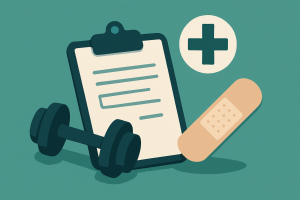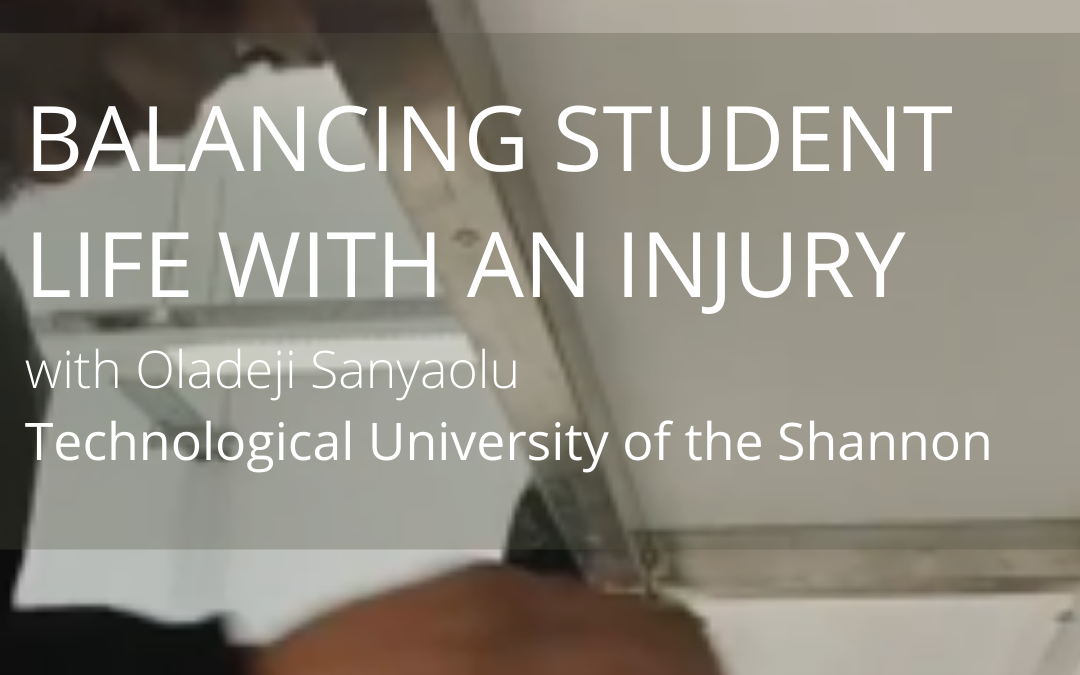Injuries can happen when you least expect them, especially when you’re balancing work, studies and student life.
Student Ambassador Oladeji Sanyaolu shares his story of resilience after a knee injury disrupted his routine. From navigating the Irish healthcare system to finding support on campus, he found a way to make the most of a challenging moment while studying in Ireland.
 Being an international student is tough, especially when you’re from outside the EU. You have the responsibility of renewing your residence permit every year, maintaining insurance, and supporting yourself throughout your studies. Fortunately, the government allows us to work part-time (and full-time during summer and winter holidays), which helps ease the burden.
Being an international student is tough, especially when you’re from outside the EU. You have the responsibility of renewing your residence permit every year, maintaining insurance, and supporting yourself throughout your studies. Fortunately, the government allows us to work part-time (and full-time during summer and winter holidays), which helps ease the burden.
Lucky for me, I was able to find a job. It only took me over a year of handing out hundreds of CVs online and in person, facing countless automated rejections, doom-scrolling Indeed, getting ghosted (again and again), doing proper interviews, and those awkward ones where you talk to a camera. Still got ghosted… okay okay, I’ll stop. But eventually, I secured a part-time job at a warehouse — just in time for the start of term!
For a few weeks, things were going fairly smoothly. I managed to balance university, work, athletics, and even a little social life. However, that all changed one Wednesday morning when I woke up with an injury in my left knee. At first, I thought it was just sore from my night shift (which had been pretty intense), but while the rest of my body recovered as the day went on, my knee continued to hurt… really badly. I could barely walk. Climbing stairs was a chore, and bending it caused sharp, unbearable pain. It felt like my knee was screaming at me: “Why would you do that?” Every movement brought a fresh wave of pain. I assumed it would get better by the next day, but the pain persisted, and I realised I needed to get it checked.
Fortunately, starting this academic year, TUS Athlone provides access to on-campus doctors. You can attend walk-ins at specific times or book an appointment online. It costs just 15 euro, compared to around 40 euro for a standard GP visit in Ireland. A few days before my next shift, and after briefly discussing it with a friend, I booked an appointment.
There was virtually no queue at the clinic — to be fair, I went around 4pm, which might have helped. I explained my issue to the doctor, who ran a few tests but couldn’t immediately diagnose the condition. She referred me for an MRI scan, prescribed anti-inflammatory medication and painkillers, and provided a doctor’s note confirming I was unfit for work for a week.
From then on, I had to pause both work and athletics, which gave me time to try new things. I was able to participate in this year’s NASA Space Apps Hackathon, hosted by my university. It was a fantastic experience and honestly deserves its own article. I also joined the dance society — it was great fun! I won’t claim to be a good dancer, especially with a bad knee, but what matters is enjoying yourself. I just had to be careful with the injury.
I also began physiotherapy to see if that would help. The clinic was run by students under the supervision of lecturers. The two students assigned to me had me try different stretches to diagnose the issue… but I could do nearly all of them without much trouble. That left them a bit puzzled, so we booked another appointment for further assessment.
In the meantime, I returned to the doctor because my medication was running out, my knee still hurt, and I needed another doctor’s note. This time it was a different doctor, so I explained everything again. He quickly diagnosed me with prepatellar bursitis — inflammation in the knee that can result from impact or overuse. I was advised to rest the knee, received a new prescription and doctor’s note, and was encouraged to go ahead with the MRI scan.
The MRI experience was smooth and surprisingly interesting. I took a bus to the clinic, checked in with the receptionist, filled out the forms, and coincidentally met someone I knew who was helping run the appointments. (Athlone really is a small town!) The whole scan took about 30 to 35 minutes. I was told that the results would be available in a week, both to me and to my doctor.
While waiting, I carried on with daily life — studying, lab work, “dancing”, staying in touch with loved ones — and then I noticed something. My knee was healing! I could walk more normally, stairs were no longer a struggle, and I could manage a few more dance moves. Still not a good dancer, but at least I could move! At my final doctor’s appointment, I saw the same doctor as the first visit. She confirmed that everything looked fine and told me to continue the medication if the pain returned. I got another doctor’s note and was able to return to work. I also completed my last physiotherapy session, where I was advised on the stretches I should continue as I recover fully.
After all this, I decided to focus on my studies, work, student ambassador role, and occasional events. I’ve put sports and societies aside for the rest of the semester.
This experience taught me an important lesson about self-management. Yes, the opportunities and excitement that come with studying in Ireland are incredible, but your body has limits. Maybe I was managing fine and just happened to injure my knee, but it reminded me that I don’t have to take on everything all at once. It is possible to find balance — just make sure looking after yourself is part of that balance too.
Student Ambassador Oladeji Sanyaolu is studying at TUS via Education in Ireland

